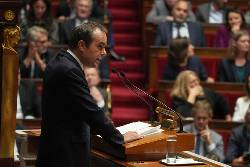PARIS (AP) — French Prime minister Sebastien Lecornu will propose the suspension of a contested plan raising the retirement age from 62 to 64, in a move to avoid his fragile minority government being immediately toppled.
Lecornu said Tuesday in a speech at the National Assembly that the law, a flagship policy of French president Emmanuel Macron, would be put on pause until after the next presidential election, to be held in 2027.
The Socialist Party, which is not part of the government, had demanded the law be repealed
Lecornu faces two no-confidence motions by the hard-left France Unbowed and far-right National Rally parties. The two parties do not hold enough seats to topple Lecornu’s government on their own, but the prime minister could quickly be undone if the Socialist Party join forces with them.
Lecornu earlier met with his cabinet to discuss proposals for the 2026 budget, which needs to be approved by the end of the year.
With his government hanging by a thread, France’s newly reappointed prime minister must make concessions to his political opponents to avoid a no-confidence vote later this week, as the country struggles to end a lingering political crisis.
The opposite sides of the political spectrum have slammed Macron’s decision to reappoint Lecornu, France’s former defense minister and fourth prime minister in barely a year. With less than two years before the next presidential election, National Rally is urging Macron to call another early parliamentary vote while France Unbowed wants Macron to step down.
Rammed through parliament without a vote in 2023 despite mass protests, the pension change gradually raises the retirement age from 62 to 64. Opposition parties want it scrapped.
The Socialist Party has demanded the law be repealed and those calling for its suspension have gained a high-profile ally. Nobel Prize-winning economist Philippe Aghion told broadcaster France 2 that it should be suspended until the next presidential election.
“I think we need to stop the clock now until the presidential election,” Aghion said, arguing that doing so would be “the way to calm things down” and “it doesn’t cost very much to pause it.”
Lecornu's reappointment is widely seen as Macron’s last chance to reinvigorate his second term. His centrist camp lacks a majority in the National Assembly and he is facing increasing criticism even within its ranks.
Macron’s surprise decision last year to dissolve the National Assembly resulted in a hung parliament and political paralysis.
Over the past year, Macron’s successive minority governments have collapsed in quick succession, leaving France mired in deadlock while confronting a rising poverty rate and a mounting debt crisis that has alarmed markets and EU partners.
...


 Copyright © 1996 - 2025 CoreComm Internet Services, Inc. All Rights Reserved. | View our
Copyright © 1996 - 2025 CoreComm Internet Services, Inc. All Rights Reserved. | View our